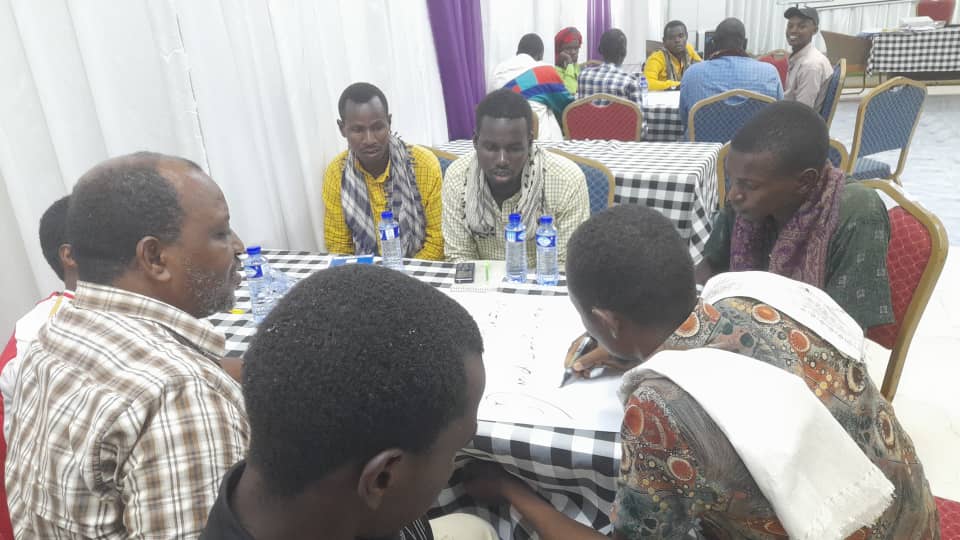17-12-2024 | di COOPI
Somalia. Transforming lives through peacebuilding: Habiba's journey
Habiba Abshir Abdi is 39-year-old mother of eleven and a resident of Isha Bulla Usley village, in the Baidoa aera in Somalia. She has witnessed years of conflict, creating divisions among the villagers causing mistrust and hostility.
We lived in fear, and the constant fighting made it difficult to build relationships. The need for peace was palpable, but achieving it seemed daunting."
Through the Swiss Agency for Development Cooperation-funded initiative, COOPI - Cooperazione Internazionale launched a peacebuilding program aimed at empowering women and youth in Baidoa to become active contributors to conflict resolution and community harmony. Part of the “Somali Resilience Program: Consolidating Resilience Gains in Somalia, Phase 5” project, the intervention focused on organizing training sessions to develop practical skills such as mediation, non-violent conflict resolution, and negotiation techniques, equipping participants with the tools needed to address disputes and foster peaceful dialogue. As a result, participants gained deeper awareness of the underlying causes of local conflicts and developed a stronger sense of their role in shaping peace within their communities. Habiba was among those who benefited from the training, acquiring not only valuable conflict-resolution skills but also the confidence to advocate for peace and participate in community decision-making processes.
She states,
My journey towards peace began when I was selected to participate in a community peacebuilding training program organized by COOPI. I felt hopeful but unsure of what to expect. Throughout the training, I learned essential skills such as active listening, mediation, and negotiation. I understand the importance of seeing things from different perspectives and building trust within our community. The training opened my eyes to the power of dialogue.”
In a region gripped by conflict and instability, peacebuilding offers more than just hope - it lays the foundation for communities to rebuild their lives and livelihoods. It is essential for fostering harmony and resilience in communities affected by conflict. Baidoa remains a volatile area, where clan rivalries and the ever-present threat of Al-Shabaab disrupt both stability and opportunity. Deep-seated gender norms further restrict women and youth from participating in decision-making, economic activities, and peace efforts, limiting the full potential of progress. Yet, Habiba’s story proves that even in such challenging environments, peacebuilding can plant the seeds of change.
The program’s impact is visible: women and youth have initiated their own peacebuilding efforts, creating inclusive spaces for dialogue that were previously inaccessible to them. Improved communication and negotiation skills have facilitated more constructive interactions, fostering understanding among community members and reducing tensions.
Habiba is a firm believer that peacebuilding and conflict resolution skills play a crucial role also in her family dynamics. She recognizes that the values of empathy, understanding, and open communication are essential not only for resolving conflicts but also for nurturing healthy relationships within her family and friends.
Determined to pass on this knowledge, I actively engage my children in discussions about the importance of peace and collaboration. We practice active listening at home, encouraging each other to express our feelings and concerns without fear of judgment. Furthermore, I have extended teachings with my close friends; we organize informal gatherings where we can practice mediation techniques and share experiences,”
she explains.
Habiba’s journey is a powerful example of how equipping individuals with essential skills and creating spaces for dialogue can help communities heal and rebuild a more harmonious future.
Thanks to COOPI, the donor, and the training I received, I now feel empowered to make a difference."
Habiba reflects.
COOPI has been working in Somalia since 1981 and has been part of the Somali Resilience Program (SomReP) consortium since 2012, with which it implements resilience programmes in the Bay and Gedo regions and intervenes in the districts of Baidoa, Dollow and Belet-Hawa. In each intervention, depending on the context, COOPI integrates one or more cross-cutting areas: protection, gender, environment and disaster risk reduction.




 Somalia
Somalia